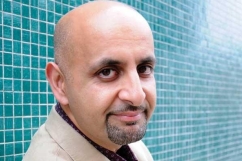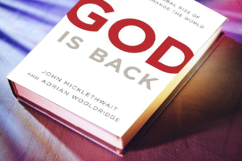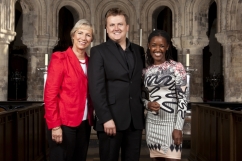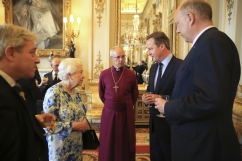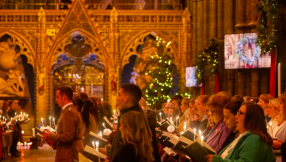Is the BBC institutionally hostile to Christianity, only interested in knocking our faith and promoting other religions? It seems unlikely, on the face of it, but that's the charge leveled against it by a Christian group that's just presented a 12,000-signature petition to director-general Lord Hall.
Voice for Justice calls on him to "protect the UK's Christian heritage and reject current proposals to reduce and downgrade Christian programming in favour of increased coverage for Muslim, Hindu and Sikh faiths". It accuses the BBC's head of religion and ethics, Aaqil Ahmed – a Muslim – of regularly commissioning documentaries "displaying clearly pro-Islamic bias, while calling into question fundamental tenets and teachings of Christianity". Britain, it says, is a Christian country and so Christianity should be treated with respect and given more airtime than minority groups; and, "In particular, Islam should not be singled out for special interest and presented as impliedly superior to Christianity."
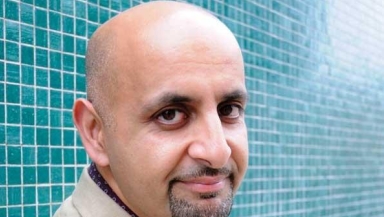
But what's behind this outrage, and is there really any substance to it? Christian Today spoke to Rev Lynda Rose, an Anglican priest and director of Voice for Justice. She said the petition arose from a Sunday Times article about an internal BBC report that said the organisation was "too Christian and must diversify".
"On the face of it that's fine, but Christian programming has been really run down," she said. Programmes about Islam had been "very supportive", but programmes about Christianity had cast doubts on major doctrines of the faith. Christians "don't make a fuss, so we're seen as fair game". We are, she says, a Christian country; no one's saying we don't want any programmes about Sikhs and Muslims, but "we have to acknowledge that this is a Christian country and when there are programmes about Christianity they should be unbiased, rather than sceptical".
Is it even appropriate that a Muslim should be in such a position at the BBC? "I would question whether it's possible for a Muslim to be head of religious programming," she said. "In a Christian country, the head of programming ought to be Christian."
The BBC was withering in its response, saying: "We are actually intending to do more programming around Christianity and more on other faiths as well, so there is absolutely no question of an 'either or' on our output." As for Ahmed, it said he is "not biased against Christianity programming, nor does he show any pro-Islamic bias and any suggestions that he does are ludicrous and unfounded".
It's probably fair to say that Rose and those who signed her petition are outliers, in terms of their dissatisfaction with the BBC's output. Her contention that Ahmed shouldn't be in his job because of his faith is startling, to put it no more strongly than that.
However, that's a long way from saying all is well with BBC religious broadcasting. In today's still-United Kingdom, religion is more important than it has been for a very long time. Globally, it is a key motivator for political and social change. In our big cities we live alongside people from at least half a dozen different faiths. But there are real questions about whether our national broadcaster is really facing up to the need to reflect these new realities – which are no longer really new.
At the beginning of May this year a round table session with the All Party Parliamentary Group (APPG) on Religion in the Media was held at Westminster and blogged by Iftikhar Khan. Aaqil Ahmed was one of the speakers, and warned of how the media's lack of understanding of conservative religious communites could lead to them increasingly becoming isolated and withdrawn. He thought there was a five to 10-year window of opportunity to turn things round.
Veteran BBC religion presenter Roger Bolton said the default position in most UK mainstream journalism was liberal secularism. He said the budget for religious programming on ITV declined from £40 million to £2 million in the five years to 2013, and likewise from £40 million to £20 million on Channel 4.
Dr Abby Day, from the Religion Media Centre at Goldsmith's College, said every newsroom should have at least one religion expert, and that a core element of all media studies courses should cover religion.
It was at the same meeting that Ahmed referred to the report for Lord Hall on whether the BBC needed to be more diverse, that sparked the Sunday Times article – and the petition from Voice for Justice. But this is only one issue, and arguably not the most important one. A repeated theme from the contributors was the need for more and better-informed religious coverage in general – and for far greater religious literacy among correspondents.
The meeting was moderated by the Bishop of Leeds, Nick Baines. As chair of the Sandford St Martin's Trust, which supports excellence in religious broadcasting, he wrote at the beginning of June to Lord Hall in the light of the forthcoming BBC Charter renewal, expressing the trust's concerns. Did the BBC have a clear strategy for supporting the genre? Who would take overall responsibility for religion broadcasting? Would the BBC invest in specialist knowledge?
Furthermore, he wrote that in BBC News, "unlike areas such as the arts, economics, finance, sport, etc, there is no religion editor nor a full time producer to support the BBC's excellent correspondent" – then Caroline Wyatt, who announced she was stepping back from reporting after a diagnosis of MS. Wyatt's replacement has not been announced, but Christian Today understands that he or she will at least have a full-time producer.
However, there is no sign that the BBC is to appoint a religion editor, or address any other of the concerns expressed by the bishop or at the APPG meeting. As the Sandford St Martin letter said: "I and my fellow trustees, among others, do wonder, at a time when it is impossible to understand the modern world – its politics, economics, military and humanitarian events – without understanding religion, why religion is not being prioritised as needing expert commissioning and interpretation in the public and broadcast sphere."
Aaqil Ahmed has been praised for his evenhandedness in his role. However, it's clear that the BBC as a whole – and not just the BBC – has a long way to go before it truly represents the religious make-up of a diverse society. And while it will always be more vulnerable to criticism because of its status as the national broadcaster, a British institution paid for by our taxes, the critique offered by Voice for Justice – however open to question its arguments and philosophy may be – is an indication that for one section of the religious community, at least, the BBC is failing to reflect the realities of their faith as they see them. If this feeling is reflected among other communities as well – and there's every reason to think it is – the case for serious thinking about religion, and serious money devoted to it, becomes even more insistent.
Follow Mark Woods on Twitter: @RevMarkWoods










